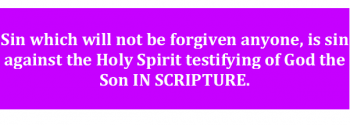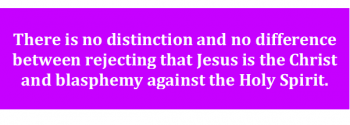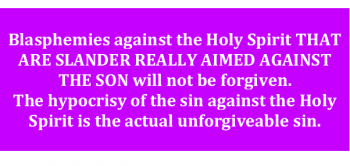- Jan 14, 2014
- 6,345
- 576
- 113
- Faith
- Christian
- Country
- South Africa
The first of humanity to be resurrected are of the heavenly resurrection of Christ’s joint heirs, and begins after Jesus Christ returns in heavenly glory, to give first attention to his spiritual brothers. Christ himself is called “the firstfruits of those who have fallen asleep in death.” Paul then says that each one will be resurrected in his own rank, “Christ the firstfruits, afterward those who belong to the Christ during his presence.” (1Co 15:20, 23) These, as “the house of God,” have been under judgment during their Christian life course, beginning with the first of their number at Pentecost. (1Pe 4:17) They are “certain [literally, some] firstfruits.” (Jas 1:18; Re 14:4) Jesus Christ can be compared to the barley firstfruits offered by the Israelites on Nisan 16 (“Christ the firstfruits”), and his spiritual brothers as “firstfruits” (“certain firstfruits”) can be compared to the wheat firstfruits offered on Pentecost day, the 50th day from Nisan 16.—Le 23:4-12, 15-20.
These have been under judgment, so at Christ’s return it is time to give the reward to them, his faithful anointed ones, just as he promised his 11 faithful apostles on the evening before his death: “I am going my way to prepare a place for you. Also, . . . I am coming again and will receive you home to myself, that where I am you also may be.”—Joh 14:2, 3; Lu 19:12-23; compare 2Ti 4:1, 8; Re 11:17, 18.
Revelation 20:5, 6 refers to the resurrection of those who will reign with Christ as “the first resurrection.” The apostle Paul speaks of this first resurrection also as “the earlier resurrection from the dead [literally, the out-resurrection the out of dead (ones)].” (Php 3:11) On the expression Paul uses here, Robertson’s Word Pictures in the New Testament (1931, Vol. IV, p. 454) says: “Apparently Paul is thinking here only of the resurrection of believers out from the dead and so double ex [out] (ten exanastasin ten ek nekron). Paul is not denying a general resurrection by this language, but emphasizing that of believers.” Charles Ellicott’s Commentaries (1865, Vol. II, p. 87) remarks on Philippians 3:11: “‘The resurrection from the dead;’ i.e., as the context suggests, the first resurrection (Rev. xx. 5), when, at the Lord’s coming the dead in Him shall rise first (1 Thessalon. iv. 16), and the quick be caught up to meet Him in the clouds (1 Thess. iv. 17); compare Luke xx. 35.
Rotherham’s translation of Philippians 3:11 reads: “If by any means I may advance to the earlier resurrection which is from among the dead.”
So the scriptures show us that this first resurrection who will be the ones resurrected to heaven and reign as kings, judges with Jesus over humanity. Then we have those who will survive Armageddon and pass into the new earth without dying but there will also be those resurrected on the new earth.
The Bible calls faithful men of old such as Abraham righteous. (Ge 15:6; Jas 2:21) Many of these men are listed at Hebrews chapter 11, and of them the writer says: “And yet all these, although they had witness borne to them through their faith, did not get the fulfillment of the promise, as God foresaw something better for us [spirit-begotten, anointed Christians like Paul], in order that they might not be made perfect apart from us.” (Heb 11:39, 40) So, the perfecting of them will take place after that of the ones having part in “the first resurrection.”
Then there is the “great crowd” described in Revelation chapter 7, who are not members of the 144,000 “sealed” ones, and who consequently do not have “the token” of the spirit as being spirit-begotten. (Eph 1:13, 14; 2Co 5:5) They are described as coming “out of the great tribulation” as survivors of it; this would seem to locate the gathering of this group in the last days shortly before that tribulation. These are righteous through faith, being clothed in white robes washed in the blood of the Lamb. (Re 7:1, 9-17) As a class, they will not need to be resurrected, but faithful ones of that group who die before the great tribulation will be resurrected in God’s due time.
Also, there are many “unrighteous” persons buried in Sheol (Hades), mankind’s common grave, or in “the sea,” watery graves. The judgment of these along with “the righteous” resurrected on earth is described in Revelation 20:12, 13: “And I saw the dead, the great and the small, standing before the throne, and scrolls were opened. But another scroll was opened; it is the scroll of life. And the dead were judged out of those things written in the scrolls according to their deeds. And the sea gave up those dead in it, and death and Hades gave up those dead in them, and they were judged individually according to their deeds.”
This judgment is placed in the Bible in the account of events occurring during Christ’s Thousand Year Reign with his associate kings and priests. These, the apostle Paul said, “will judge the world.” (1Co 6:2) “The great and the small,” persons from all walks of life, will be there, to be judged impartially. They are “judged out of those things written in the scrolls” that will be opened then. This could not mean the record of their past lives nor a set of rules that judges them on the basis of their past lives. For since “the wages sin pays is death,” these by their death have received the wages of their sin in the past. (Ro 6:7, 23) Now they are resurrected that they might demonstrate their attitude toward God and whether they wish to take hold of the ransom sacrifice of Jesus Christ that was given for all. (Mt 20:28; Joh 3:16)
Sort of fine up to where you started the First Resurrection for a second time <<after Armageddon>>. Sad. It shows you have not ever made the subject or its study your own, but just quote someone else or others WHO SIMPLY REFUSED TO BE CALVINIST AND PROTESTANT ORDINARY. Very sad.






